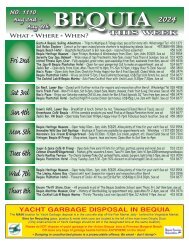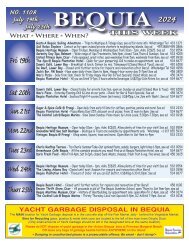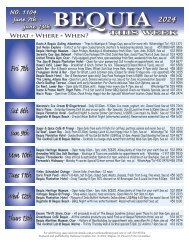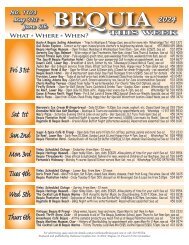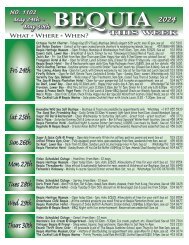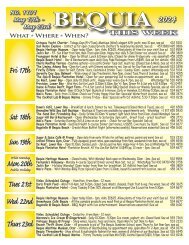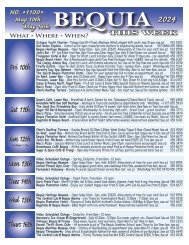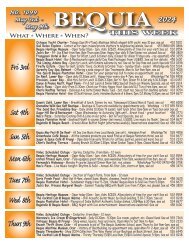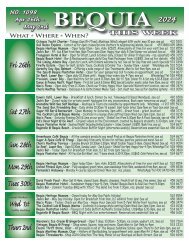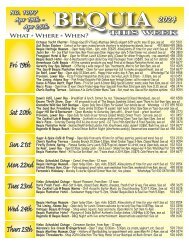Caribbean Compass Yachting Magazine - November 2020
Welcome to Caribbean Compass, the most widely-read boating publication in the Caribbean! THE MOST NEWS YOU CAN USE - feature articles on cruising destinations, regattas, environment, events...
Welcome to Caribbean Compass, the most widely-read boating publication in the Caribbean! THE MOST NEWS YOU CAN USE - feature articles on cruising destinations, regattas, environment, events...
You also want an ePaper? Increase the reach of your titles
YUMPU automatically turns print PDFs into web optimized ePapers that Google loves.
WHAT’S ON MY MIND<br />
ONCE UPON A TIME<br />
IN VENEZUELA<br />
Or, In Every Dark Cloud<br />
There’s a Silver Lining<br />
by John Everton<br />
Back in 1989 my wife Roni and I were lucky enough to spend eight months in<br />
Venezuela with our kids, Kylie and Iain, aboard our 50-foot Manuel Campos<br />
ketch, Gaucho, launched in Argentina in 1943. What turned out to be our<br />
best travel experience in the country was precipitated by what we originally<br />
viewed as a misfortune.<br />
We left Prickly Bay on the south coast of Grenada at 4:00pm bound for a morning<br />
landfall at Los Testigos. After checking in with the Guardacostas, who also sold us<br />
cold beer, we climbed and played in the soft hundred-foot sand dunes, accepting the<br />
kids’ challenge of rolling down without rolling into the prickly vines — we made<br />
it! We then discovered there was a fiesta happening with fishing boat races, food and<br />
more ice-cold Polar beer — more fun!<br />
NOVEMBER <strong>2020</strong> CARIBBEAN COMPASS PAGE 26<br />
Breakthrough Bay, Los Testigos<br />
The next morning we departed for Pampatar on Isla Margarita, a few hours’ sail to<br />
the west. We arrived in Pampatar, a small fishing harbour that could accommodate<br />
a few yachts, in time to clear in with the authorities and then meet friends for lunch,<br />
the first of many memorable meals in charming little restaurants during our stay. <br />
As we were walking down a shady street after lunch I remarked to Roni what a<br />
peaceful little town it was when I felt something bump my arm. I turned to say,<br />
“excuse me,” and then I noticed a moped with two well-dressed juvenile delinquents<br />
speeding away with my bag containing our passports and ship’s papers. After a few<br />
hours of futile searching alongside the road we went to the police station to report<br />
the theft. I doubted little would be done to apprehend the banditos but the good part<br />
was that we received a very official-looking typewritten document with its half a<br />
dozen stamps, stating what had happened and serving as our travel permit within<br />
the country. Having this form actually expedited checking in at ports on our journey<br />
to obtain new passports at our consulates in Caracas. Maybe they felt sorry for us.<br />
And so it was we cruised the coast and offshore islands until we reached Carenero,<br />
a well-protected harbour with an adjacent mangrove lagoon just to the east of Cabo<br />
Codera. Every evening before sunset we would dinghy into the lagoon down to a<br />
certain group of trees where the birds flew in to roost for the night: first the scarlet<br />
Ibis, next the white egrets and third the green and yellow mangrove parrots<br />
chattering away, each species to its own tree. The cluster of tree branches sporting<br />
different colours evoked a Christmas mood.<br />
It was easy to spend time in Carenero, which we used as a staging area for a couple<br />
of bus trips to Caracas from Higuerote, the nearest town with a bus terminal.<br />
On the first trip we took up the long winding mountain road to the capital, the bus<br />
was full and I just managed to squeeze onto the last seat next to a large lady —<br />
Arminda. Although she spoke not a word of English and my Spanish wasn’t much<br />
better, after a three-and-a-half-hour ride listening to her non-stop chatter I started to<br />
comprehend most of what she was saying and was able to communicate back to her.<br />
When we arrived at the Caracas terminal Arminda made a point of stopping people<br />
on the street and asking directions on our behalf — the first being a restroom, then<br />
the Mariner outboard outlet — even though she had a full day of shopping and a<br />
dental visit scheduled.<br />
At the US Consulate the children and I were able to procure new passports over<br />
the lunch hour. At the British Consulate Roni was told to return two weeks later for<br />
hers. Boarding the return bus that afternoon there was one empty seat next to me.<br />
As we readied to pull out of the station Arminda showed up with her arms loaded<br />
with shopping bags and her face all puffed up from her dental visit. And so it was I<br />
was able to hone my Spanish language skills to another degree on the hair-raising<br />
ride down the mountain. It was good to have someone to talk to and to keep my hair<br />
from rising too much, and Arminda was as voluble as ever despite her swolen jaw.<br />
Arriving in Higuerote she gave us directions to her boyfriend’s restaurant and told<br />
us to come visit there and enjoy a meal, which we did the following day. After a<br />
delicious and very reasonable beefsteak lunch with all the beers on the house and<br />
more lively conversation we invited them to visit us on our boat the next day. They<br />
happily did and we polished off a bottle of rum while divining more mysteries of the<br />
Spanish language. As if that weren’t enough socializing, Arminda invited us to their<br />
apartment the following evening to share a typical Venezuelan meal of arepas with<br />
several different fillings. The other couple present also spoke no English and so after<br />
dinner we played cards and dominoes, drank rum and tried to converse in Spanish,<br />
sharing many jokes amidst much laughter. It felt like a festive occasion —<br />
Venezuelans are known to party any time friends get together.<br />
After meeting mostly European and American yachtspeople in many ports it was<br />
refreshing to meet such welcoming local people and we remember that as the<br />
highlight of our Venezuelan visit. This of course would never have transpired if the<br />
passports hadn’t been stolen, nor would we have gotten to see Caracas with its<br />
modern clean and efficient subway, designed and built by the French, or enjoyed<br />
watching the birds roosting, or visited Isla Tortuga where we caught a surfeit of<br />
dorado, among other things.<br />
And so we ended up being thankful to those well-dressed juvenile delinquents who<br />
snatched our bag.




